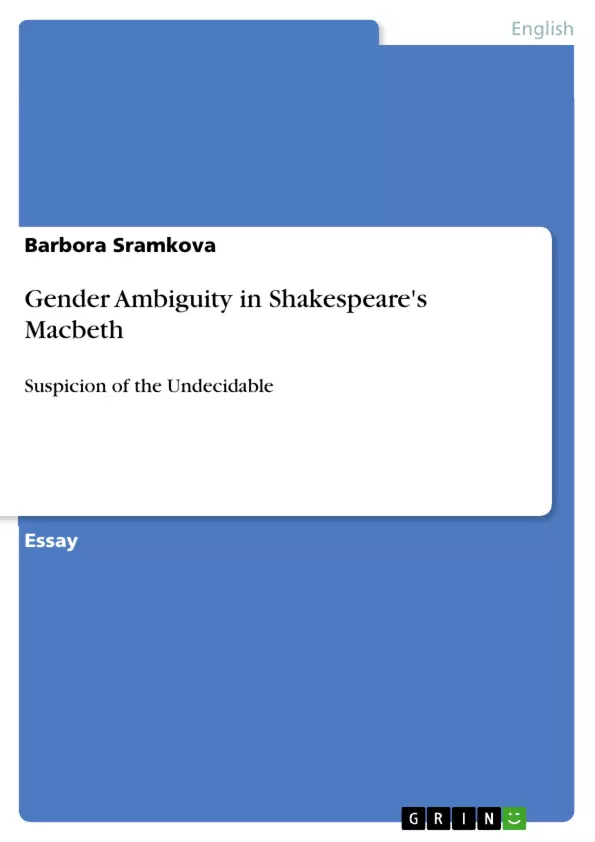Probably the most powerful lines lingering in the reader’s or audience’s memory after experiencing Macbeth are the hero’s words in reaction to the news of the death of his spouse:
“Out, out, brief candle!
Life’s but a walking shadow, a poor player
That struts and frets his hour upon the stage
And then is heard no more. It is a tale
Told by an idiot, full of sound and fury,
Signifying nothing.” (V, 5, 23-28)
When life signifies nothing, does this play signify anything? However simple the question may seem, the answer is hardly straightforward. Trying to stay away from moralising about vaulting ambition that doesn’t pay in the end I would like to speculate about possible significations of the play, not necessarily connected to the plot, or to put it in another way, examine the possibly significant themes and motives recurrent in the play: ambiguity, uncertainty or indeterminacy of meaning. Equivocation is the term used in the play itself (e.g. the porter scene in III, i) and it well captures the theme of walking the tightrope above the abyss of single, definite meaning on one hand, and the endless proliferation of meaning on the other. One cannot escape the impression that the thematically prominent characters of the play (Macbeth, Lady Macbeth, the witches, the Porter) virtually evade committing themselves to definite meanings.
Table of Contents
- Ambiguity and the Undecidable
- Gender Ambiguity
- Identity and Integrity
- The Natural and the Unnatural
- Doubleness and Multiplicity
- The Battle for Identity
Objectives and Key Themes
This essay explores the theme of ambiguity in Shakespeare's Macbeth, focusing on how the play challenges traditional binary oppositions and explores the idea of a fragmented or shifting identity. The essay argues that ambiguity is not simply a stylistic device but a central element of the play's thematic concerns.- Gender ambiguity and the blurring of traditional gender roles
- The nature of personal identity and integrity
- The relationship between the natural and supernatural
- The role of doubleness and multiplicity in shaping the play's themes
- The impact of ambiguity on character development and interpretation
Chapter Summaries
The essay begins by introducing the theme of ambiguity in Macbeth, using Macbeth's famous "Out, out, brief candle!" speech to illustrate the play's focus on uncertainty and indeterminacy. It then explores the concept of equivocation, arguing that it is a key term for understanding the play's treatment of ambiguity. The essay then examines the theme of gender ambiguity, analyzing the characters of the witches, Lady Macbeth, and Macbeth themselves. It argues that the play challenges traditional gender roles and explores the idea of a fragmented identity. The essay also examines the theme of personal identity and integrity, arguing that Macbeth's character is marked by a struggle for self-understanding. The essay explores how Macbeth's actions and choices reveal the complexity of his identity and the consequences of his fractured sense of self. The essay concludes by examining the theme of the natural and the supernatural, arguing that the play blurs the boundaries between these two realms. It explores how the supernatural elements in the play challenge traditional conceptions of reality and create a sense of unease and uncertainty.Keywords
The essay focuses on the exploration of themes such as gender ambiguity, personal identity, equivocation, doubleness, and the relationship between the natural and supernatural in Shakespeare's Macbeth.Frequently Asked Questions
How is gender ambiguity presented in Shakespeare's Macbeth?
Gender ambiguity is seen in the Witches, who have beards, and Lady Macbeth, who asks to be "unsexed." The play challenges traditional binary roles of masculinity and femininity throughout the narrative.
What does the term "equivocation" mean in the context of the play?
Equivocation refers to the use of ambiguous language to conceal the truth. In Macbeth, it represents the "walking of a tightrope" between definite meaning and the endless proliferation of possible interpretations.
How do the Witches contribute to the theme of uncertainty?
The Witches embody "doubleness" and "indeterminacy." Their prophecies are technically true but misleading, leading Macbeth into a state of psychological and moral confusion.
What is the significance of Macbeth's "Out, out, brief candle" speech?
This speech highlights the theme of nihilism and the fragmentation of identity. It suggests that life is a "walking shadow" and a tale "signifying nothing," reflecting Macbeth's total loss of purpose.
In what way does the play blur the lines between natural and unnatural?
By introducing supernatural elements and characters who defy their natural roles (like Lady Macbeth), the play creates an environment where traditional reality is constantly questioned and disrupted.
- Citar trabajo
- Dr.phil. Barbora Sramkova (Autor), 1996, Gender Ambiguity in Shakespeare's Macbeth, Múnich, GRIN Verlag, https://www.grin.com/document/134693



